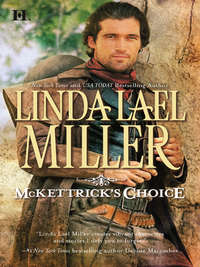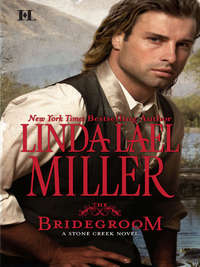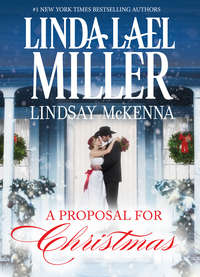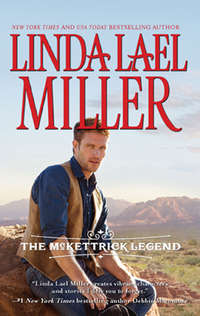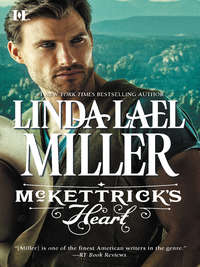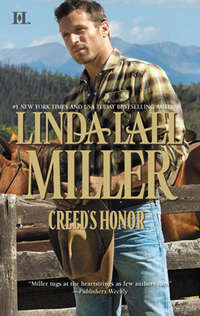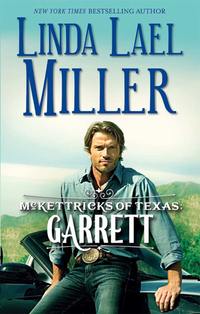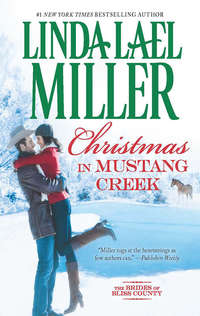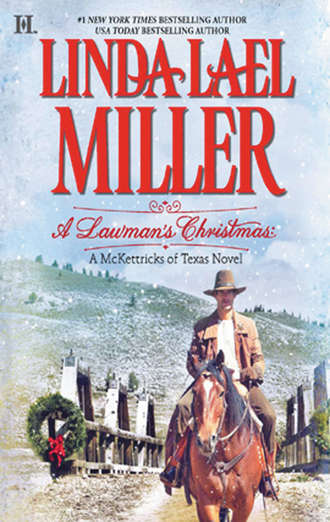
Полная версия
A Lawman's Christmas: A McKettricks of Texas Novel
Edrina’s very fetching mother looked him over again, this time with something that might have been chagrin. Then she bristled again, like a little bird ruffling up faded feathers. “You’re him, aren’t you?” she accused. “The new marshal?”
“Yes, ma’am,” Clay said, confounded by the strange mixture of terror and jubilation rising up within him. “I am the new marshal. And you are…?”
“Dara Rose Nolan. You may address me as Mrs. Nolan, if you have any further reason to address me, which I do not anticipate.”
With that, she turned on one shabby-heeled shoe and pointed herself toward the “cottage,” with its sagging roof, leaking rain barrel and sparkling-clean windows.
Edrina and another little girl—the aforementioned Harriet, no doubt—darted out of the doorway as their mother approached, vanishing into the interior of the house.
Clay watched appreciatively as the widow Nolan retreated hurriedly up the walk, with nary a backward glance.
Chickens, pecking peacefully at the ground, squawked and flapped their wings as they fled.
The door slammed behind her.
Clay smiled, resettled his hat and got back on his horse.
Before, he’d dreaded the long and probably idle months ahead, expecting the season to be a lonesome one, and boring, to boot, since he knew nothing much ever happened in Blue River, when it came to crime. That was the main reason the town fathers hadn’t been in any big rush to replace Parnell Nolan.
Now, reining Outlaw away toward the edge of town, and the open country beyond, meaning to ride up onto a ridge he knew of, where the view extended for miles in every direction, Clay figured the coming winter might not be so dull, after all.
INSIDE THE HOUSE, Dara Rose drew a deep breath and sighed it out hard.
Heaven knew, she hadn’t been looking forward to the new marshal’s arrival, given the problems that were sure to result, but she hadn’t planned on losing her composure and behaving rudely, either. Poor as she was, Dara Rose still had high standards, and she believed in setting a good example for her children, prided herself on her good manners and even temperament.
Imagining how she must have looked to Clay McKettrick, rushing out of the house, scaring the chickens half to death in the process, she closed her eyes for a moment, then sighed again.
Edrina and Harriet watched her from the big rocking chair over by the wood-burning stove, Edrina wisely holding her tongue, Harriet perched close beside her, her rag doll, Molly, resting in the curve of one small arm.
The regulator clock ticked ponderously on the wall, lending a solemn rhythm to the silence, and snow swirled past the windows, as if trying to find a way in.
Dara Rose shivered.
“What are we going to do, Mama?” Edrina asked reasonably, and at some length. She was a good child, normally, helpful and even tempered, but her restlessness and curiosity often led her straight into mischief.
Dara Rose looked up at the oval-framed image of her late husband, Parnell Nolan, and her throat thickened as fresh despair swept over her. Despite the scandalous way he died, she missed him, missed the steadiness of his presence, missed his quiet ways and his wit.
“I don’t rightly know,” Dara Rose admitted, after swallowing hard and blinking back the scalding tears that were always so close to the surface these days. “But never you mind—I’ll think of something.”
Edrina slipped a reassuring arm around Harriet, who was sucking her thumb.
Dara Rose didn’t comment on the thumb-sucking, though it was worrisome to her. Harriet had left that habit behind when she was three, but after Parnell’s death, nearly a year ago now, she’d taken it up again. It wasn’t hard to figure out why—the poor little thing was frightened and confused.
So was Dara Rose, for that matter, though of course she didn’t let on. With heavy-handed generosity, Mayor Ponder and the town council had allowed her and the children to remain in the cottage on the stipulation that they’d have to vacate when a marshal was hired to take Parnell’s place.
“Don’t worry,” Edrina told her sister, tightening her little arm around the child, just briefly. “Mama always thinks of something.”
It was true that Dara Rose had managed to put food on the table by raising vegetables in her garden patch, taking in sewing and the occasional bundle of laundry and sometimes sweeping floors in the shops and businesses along Main Street. As industrious as she was, however, the pickings were already slim; without the house, the situation would go from worrisome to destitute.
Oh, she had choices—there were always choices, weren’t there?—but they were wretched ones.
She could become a lady of the evening over at the Bitter Gulch Saloon and maybe—maybe—earn enough to board her children somewhere nearby, where she could see them now and then. How long would it be before they realized how she was earning their living and came to despise her? A year, two years? Three?
Her second option was only slightly more palatable; Ezra Maddox had offered her a job as his cook and housekeeper, on his remote ranch, but he’d plainly stipulated that she couldn’t bring her little girls along. In fact, he’d come right out and said she ought to just put Edrina and Harriet in an orphan’s home or farm them out to work for their keep. It would be good for their character, he’d claimed.
In fact, the last time he’d come to call, the previous Sunday after church, he’d stood in this very room, beaming at his own generosity, and announced that if Dara Rose measured up, he might even marry her.
The mere thought made her shudder.
And the audacity of the man. He expected her to turn her daughters over to strangers and spend the rest of her days darning his socks and cooking his food, and in return, he offered room, board and a pittance in wages. If she “measured up,” as he put it, she’d be required to share his bed and give up the salary he’d been paying her, too.
Dara Rose’s final prospect was to take her paltry savings—she kept them in a fruit jar, hidden behind the cookstove in the tiny kitchen—purchase train tickets for herself and her children and travel to San Antonio or Dallas or Houston, where she might find honest work and decent lodgings.
But suppose she didn’t find work? Times were hard. The little bit of money she had would soon be eaten up by living expenses, and then what?
Dara Rose knew she’d be paralyzed by these various scenarios if she didn’t put them out of her head and get busy doing something constructive, so she headed for the kitchen, meaning to start supper.
Last fall, someone had given her the hindquarter of a deer, and she’d cut the meat into strips and carefully preserved it in jars. There were green beans and corn and stubby orange carrots from the garden, too, along with apples and pears from the fruit trees growing be hind the church, and berries she and the girls had gathered during the summer and brought home in lard tins and baskets. Thanks to the chickens, there were plenty of eggs, some of which she sold, and some she traded over at the mercantile for small amounts of sugar and flour and other staples. Once in a great while, she bought tea, but that was a luxury.
She straightened her spine when she realized Edrina had followed her into the little lean-to of a kitchen.
“I like Mr. McKettrick,” the child said conversationally. “Don’t you?”
Keeping her back to the child, Dara Rose donned her apron and tied it in back with brisk motions of her hands. “My opinion of the new marshal is neither here nor there,” she replied. “And don’t think for one moment, Edrina Louise Nolan, that I’ve forgotten that you ran away from school again. You are in serious trouble.”
Edrina gave a philosophical little sigh. “How serious?” she wanted to know. “Very serious,” Dara Rose answered, adding wood to the fire in the cookstove and jabbing at it with a poker.
“I think we’re all in serious trouble,” Edrina observed sagely.
Out of the mouths of babes, Dara Rose thought.
“Do we have to be orphans now, Mama?” Harriet asked. As usual, she’d followed Edrina.
Dara Rose put the poker back in its stand beside the stove and turned to look at her daughters. Harriet clung to her big sister’s hand, looking up at her mother with enormous, worried eyes.
“We are a family,” she said, kneeling and wrapping an arm around each of them, pulling them close, drawing in the sweet scent of their hair and skin, “and we are going to stay together. I promise.”
Now to find a way to keep that promise.
Chapter 2
The snow was coming down harder and faster when Clay returned to Blue River from the high ridge, where he’d breathed in the sight of his land, the wide expanse of it and the sheer potential, Outlaw strong and steady beneath him.
Dusk was fast approaching now, and lamps glowed in some of the windows on Main Street, along with the occasional stark dazzle of a lightbulb. Clay had yet to decide whether or not he’d have his place wired for electricity when the time came; like the telephone, it was still a newfangled invention as far as he was concerned, and he wasn’t entirely sure it would last.
At the livery stable, Clay made arrangements for Outlaw and then headed in the direction of the Bitter Gulch Saloon, where he figured the mayor and the town council were most likely to be waiting for him.
Most of the businesses were sealed up tight against the weather, but the saloon’s swinging doors were all that stood between the crowded interior and the sidewalk. A piano tinkled a merry if discordant tune somewhere in all that roiling blue cigar smoke, and bottles rattled against the rims of glasses.
The floor was covered in sawdust; the bar was long and ornately carved with various bare-breasted women pouring water into urns decorated with all sorts of flowers and mythical animals and assorted other decorations.
Clay removed his hat, thumped the underside of the brim with one forefinger to knock off the light coating of snow and caught a glimpse of his own reflection in the chipped and murky glass of the mirror in back of the bar.
He didn’t commonly frequent saloons, not being much of a drinker, but he knew he’d be dropping in at the Bitter Gulch on a regular basis, once he’d been sworn in as marshal and taken up his duties. Douse the seeds of trouble with enough whiskey and they were bound to take root, break ground and sprout foliage faster than the green beans his ma liked to plant in her garden every spring.
One glance told him he’d been right to look for Mayor Ponder and his cronies here—they’d gathered around a table over in the corner, near the potbellied stove, each with his own glass and his own bottle.
Inwardly, Clay sighed, but he managed a smile as he approached the table, snow melting on the shoulders of his duster.
“Good to see you, Clay,” Mayor Ponder said cordially, as one of the others in the party dragged a chair over from a nearby table. “Sent a boy to fetch your trunk from the depot,” the older man went on, as Clay joined them, taking the offered seat without removing his coat. He didn’t plan on staying long. “You didn’t say where you wanted your gear sent, so I told Billy to haul it over to the jailhouse for the time being.”
“Thanks,” Clay said mildly, setting his hat on the table. At home, the McKettrick women enforced their own private ordinance against such liberties, on the grounds that it was not only unmannerly, but bad luck and a mite on the slovenly side, too.
“Have a drink with us?” Ponder asked, studying Clay thoughtfully through the shifting haze of smoke. The smell of unwashed bodies and poor dental hygiene was so thick it was nearly visible, and he felt a strong and sudden yearning to be outside again, in the fresh air.
Clay shook his head. “Not now,” he said. “It’s been a long day, and I’m ready for a meal, a hot bath and a bed.”
Ponder cleared his throat. “Speaking of, well, beds, I’m afraid the house we offered you is still occupied. We’ve been telling Dara Rose that she’d have to move when we found a replacement for Parnell, but so far, she’s stayed put.”
Dara Rose. Clay smiled slightly at the reminder of the fiery little woman who’d burst through the door of that shack a couple of hours before when he showed up with Edrina, stormed through a flock of cacophonous chickens and let him know, in no uncertain terms, that she wasn’t at all glad to see him.
There had been no shortage of women in Clay McKettrick’s life—he’d even fallen in love with one, to his eventual sorrow—but none of them had affected him quite the way the widow Nolan did.
“No hurry,” Clay said easily, resting his hands on his thighs. “I can get a room at the hotel, or bunk in at the jailhouse.”
“The town of Blue River cannot stand good for the cost of lodgings,” Ponder said, looking worried. “Having that power line strung all the way out here from Austin depleted our treasury.”
One of the other men huffed at that, and poured himself another shot of whiskey. “Hell,” he said, with a hiccup, “we’re flat busted and up to our hind ends in debt.”
Ponder flushed, and his big whiskers quivered along with those heavy jowls of his. “We can pay the agreed-upon salary,” he stated, after glaring over at his colleague for a long moment. “Seventy-five dollars a month and living quarters, as agreed.” He paused, flushed. “I’ll speak to Mrs. Nolan in the morning,” he clarified. “Tell her she needs to make other arrangements immediately.”
“Don’t do that,” Clay said, quietly but quickly, too. He took a breath, slowed himself down on the inside. “I don’t mind paying for a hotel room or sleeping at the jail, for the time being.”
The little group exchanged looks.
Snow spun at the few high windows the Bitter Gulch Saloon boasted, like millions of tiny ghosts in search of someplace to haunt.
“A deal,” Ponder finally blustered, “is a deal. We offered you a place to live as part of your salary, and we intend to keep our word.”
Clay rubbed his chin thoughtfully. His beard was coming in again, even though he’d shaved that morning, on board the train. Nearly cut his own throat in the process, as it happened, because of the way the car jostled along the tracks. “Where are Mrs. Nolan and her little girls likely to wind up?” he asked, hoping he didn’t sound too concerned. “Once they’ve moved out of that house, I mean.”
“Ezra Maddox offered for her,” said another member of the council. “He’s a hard man, old Ezra, but he’s got a farm and a herd of dairy cows and money in the bank, and she could do a lot worse when it comes to husbands.”
Clay felt a strange stab at the news, deep inside, but he was careful not to let his reaction show. He felt something for Dara Rose Nolan, but what that something was exactly was a matter that would require some sorting out.
“Ezra ain’t willing to take the girls along with their mama, though,” imparted the first man, pouring himself yet another dose of whiskey and throwing it back without so much as a shudder or a wince. The stuff might have been creek water, for all the effect it seemed to have going down the fellow’s gullet. “And he didn’t actually offer to marry up with Dara Rose right there at the beginning, either. He means to try her out as a housekeeper before he makes her his wife. Ezra likes to know what he’s getting.”
Someplace in the middle of Clay’s chest, one emotion broke away from the tangle and filled all the space he occupied.
It was pure anger, cold and urgent and prickly around the edges.
What kind of man expects a woman to part with her own children? he wondered, silently furious. His neck turned hot, and he had to release his jaw muscles by force of will.
“Dara Rose is a bit shy on choices at the moment, if you ask me,” Ponder put in, taking a defensive tone suggesting he was a friend of Ezra Maddox’s and meant to take the man’s part if a controversy arose. With a wave of one hand, he indicated their surroundings, including the half dozen saloon girls, waiting tables in their moth-eaten finery. “If she turns Ezra down, she’ll wind up right here.” He paused to indulge in a slight smile, and Clay underwent another internal struggle just to keep from backhanding the mayor of Blue Creek hard enough to send him sprawling in the dirty sawdust. “Can’t say as I’d mind that, really.”
Clay seethed, but his expression was schooled to quiet amusement. He’d grown up playing poker with his granddad, his pa and uncles, his many rambunctious cousins, male and female. He knew how to keep his emotions to himself.
Mostly.
“And you a married man,” scolded one of the other council members, but his tone was indulgent. “For shame.”
Clay pushed his chair back, slowly, and stood. Stretched before retrieving his hat from its place on the table. “I will leave you gentlemen to your discussion,” he said, with a slight but ironic emphasis on the word gentlemen.
“But we meant to swear you in,” Ponder protested. “Make it official.”
“Morning will be here soon enough,” Clay said, putting his hat on. “I’ll meet you at the jailhouse at eight o’clock. Bring a badge and a Bible.”
Ponder did not look pleased; he was used to piping the tune, it was obvious, and most folks probably danced to it.
Most folks weren’t McKettricks, though.
Clay smiled an idle smile, tugged at the brim of his hat in a gesture of farewell and turned to leave the saloon. Just beyond the swinging doors, he paused on the sidewalk to draw in some fresh air and look up at the sky.
It was snow-shrouded and dark, that sky, and Clay wished for a glimpse, however brief, of the stars.
He’d come to Blue River to start a ranch of his own, marry some good woman and raise a bunch of kids with her, build a legacy comparable to the one his granddad had established on the Triple M. Figuring he’d never love anybody but Annabel Carson, who had made up her mind to wed his cousin Sawyer, come hell or high water, he hadn’t been especially stringent with his requirements for a bride.
He wanted a wife and a partner, somebody loyal who’d stand shoulder to shoulder with him in good times and bad. She had to be smart and have a sense of humor—ranching was too hard a life for folks lacking in those characteristics, in his opinion—but she didn’t necessarily have to be pretty.
Annabel was mighty easy on the eyes, after all, and look where that got him. Up shit creek without a paddle, that was where. She’d claimed to love Clay with her whole heart, but at the first disagreement, she’d thrown his promise ring in his face and gone chasing after Sawyer.
Even now, all these months later, the recollection carried a powerful sting, racing through Clay’s veins like snake venom.
Crossing the street to the town’s only hotel, its electric lights glowing a dull gold at the downstairs windows, Clay rode out the sensation, the way he’d trained himself to do, but a remarkable thing happened at the point when Annabel’s face usually loomed up in his mind’s eye.
He saw Dara Rose Nolan there instead.
BY THE TIME DARA ROSE got up the next morning, washed and dressed and built up the fires, then headed out to feed and water the chickens and gather the eggs, the snow had stopped, the ground was bare and the sky was a soft blue.
She hadn’t slept well, but the crisp bite of approaching winter cleared some of the cobwebs from her beleaguered brain, and she smiled as she worked. Her situation was as dire as ever, of course, but daylight invariably raised her hopes and quieted her fears.
When the sun was up, she could believe things would work out in the long run if she did her best and maintained her faith.
She would find a way to earn an honest living and keep her family together. She had to believe that to keep putting one foot in front of the other.
This very day, as soon as the children had had their breakfast and Edrina had gone off to school, Dara Rose decided, flinging out ground corn for the chickens, now clucking and flapping around her skirts and pecking at the ground, she and her youngest daughter would set out to knock on every respectable door in town if they had to.
Someone in Blue River surely needed a cook, a housekeeper, a nurse or some combination thereof. She’d work for room and board, for herself and the girls, and they wouldn’t take up much space, the three of them. What little cash they needed, she could earn by taking in sewing.
The idea wasn’t new, and it wasn’t likely to come to fruition, either, given that most people in town were only a little better off than she was and therefore not in the market for household help, but it heartened Dara Rose a little, just the same, as she finished feeding the chickens, dusted her hands together and went to retrieve the egg basket, hanging by its handle from a nail near the back door.
Holding her skirts up with one hand, Dara Rose ducked into the tumbledown chicken coop and began gathering eggs from the straw where the hens roosted.
That morning, there were more than a dozen—fifteen, by her count—which meant she and Edrina and Harriet could each have one for breakfast. The remainder could be traded at the mercantile for salt—she was running a little low on that—and perhaps some lard and a small scoop of white sugar.
Thinking these thoughts, Dara Rose was humming under her breath as she left the chicken coop, carrying the egg basket.
She nearly dropped the whole bunch of them right to the ground when she caught sight of the new marshal, riding his fancy spotted horse, reining in just the other side of the fence, a shiny nickel star gleaming on his worn coat.
It made him look like a gunslinger, that long coat, and the round-brimmed hat only added to the rakish impression.
Already bristling, Dara Rose drew a deep breath and rustled up a smile. It wasn’t as if the man existed merely to irritate and inconvenience her, after all.
The marshal, swinging down out of the saddle and approaching the rickety side gate to stroll, bold as anything, into her yard, did not smile back.
Dara Rose’s high hopes shriveled instantly as the obvious finally struck her: Clay McKettrick had come to send her and the children packing. He’d want to move himself—and possibly a family—in, and soon. The fact that he had a fair claim to the house did nothing whatsoever to make her feel better.
“Mornin’,” he said, standing directly in front of her now, and pulling politely at the brim of his hat before taking it off.
“Good morning,” Dara Rose replied cautiously, still mindful of her rudeness the day before and the regret it had caused her. Her gaze moved to the polished star pinned to his coat, and she felt an achy twinge of loss, remembering Parnell.
Poor, well-meaning, chivalrous Parnell.
Greetings exchanged, both of them just stood there looking at each other, for what seemed like a long time.
Finally, Marshal McKettrick cleared his throat, holding his hat in both hands now, and the wintry sun caught in his dark hair. He looked as clean as could be, standing there, his clothes fresh, except for the coat, and his boots brushed to a shine.
Dara Rose felt a small, peculiar shift in a place behind her heart.
“I just wanted to say,” the man began awkwardly, inclining his head toward the house, “that there’s no need for you and the kids to clear out right away. I spent last night at the hotel, but there’s a cot and a stove at the jail house, and that will suit me fine for now.”
Dara Rose’s throat tightened, and the backs of her eyes burned. She didn’t quite dare to believe her own ears. “But you’re entitled to live here,” she reminded him, and then could have nipped off her tongue. “And surely your wife wouldn’t want to set up housekeeping in a—”
In that instant, the awkwardness was gone. The marshal’s mouth slanted in a grin, and mischief sparkled in his eyes. They were the color of new denim, those eyes.
“I don’t have a wife,” he said simply. “Not yet, any how.”




